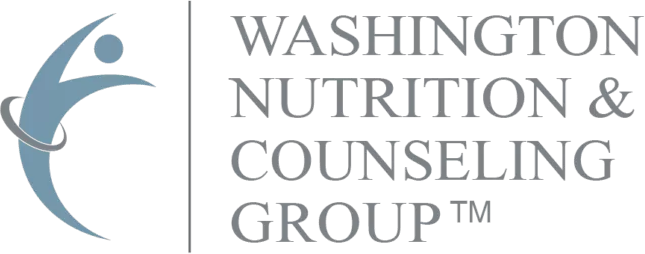At Washington Nutrition and Counseling Group we offer an eating disorder nutrition evaluation with our licensed dietitian nutritionists specializing in eating disorders for adolescents, teens and adults.
Eating disorders are driven by conditions that are becoming more prevalent than ever causing those suffering from them to have difficulty seeing themselves clearly, and drive them to take on unhealthy and in some cases deadly habits to control their eating. Eating disorders are notoriously difficult to treat, but successful methods have been developed, and there is hope.
Did You Know?
Anorexia and Bulimia, two prevalent types of eating disorders are typically found in those who were raised in cultures and families that had sufficient resources to remain adequately fed. Eating disorders are disturbingly prevalent in the United States, with 30 million people from every walk of life suffering from an eating disorder. This is particularly disturbing when you realize that of all the mental disorders, eating disorders have the highest mortality rate with a sufferer dying every 62 minutes.
Anorexia Nervosa
The most well-known eating disorder was brought into public awareness by Karen Carpenter and is called Anorexia Nervosa. This condition is common enough that just under 1% of all women suffer from it at some point during their lives, and 1 in 5 of those who live with it for extended periods commit suicide. While a mental disorder, this condition has been revealed to be congenital, and it occurs much more often in those whose parents have suffered from it during their lives. Treatment for this condition is complicated and requires both creating mindfulness in the patient of their distorted relationship with food and how to correct it, and helping them learn to see themselves. Anorexia Nervosa is indicated by extremely rigid eating patterns and unrealistic and dangerous weight-loss goals. Treatment of anorexia is possible, and recovery is achievable. An outpatient treatment team involves a mental health therapist, dietitian nutritionist, physician, and psychiatrist for medication management if necessary. It is recommended you meet with your mental health therapist and licensed dietitian weekly and work with a psychiatrist for medication that can help address underlying causes of anorexia.
Bulimia Nervosa
Bulimia is an eating disorder identified by a binge and purge mentality in the patient. Unlike those suffering from Anorexia, Bulimia sufferers will consume food in seemingly normal proportions. However, they will then purge these calories through self-induced vomiting once out of sight of others. In some cases Anorexia and Bulimia can coexist, in these cases, the anorexic patient will struggle with not eating, and when they fail to avoid eating will vomit to eliminate those calories. Bulimia patients tend to have mood, anxiety, and substance abuse disorders existing alongside their bulimia. Treatment of bulimia is possible, and recovery is achievable. An outpatient treatment team involves a mental health therapist, dietitian nutritionist, physician, and psychiatrist for medication management if necessary. It is recommended you meet with your mental health therapist and licensed dietitian weekly and work with a psychiatrist for medication that can help conditions that may be triggering bulimia.
Binge Eating
Binge eating is defined by out of control eating and not being able to stop more than a few times a week which can cause many nutrition-related health conditions such as diabetes, high blood pressure, and obesity. It can also lead to extreme guilt and depression. Treatment of binge eating is possible, and recovery is achievable. An outpatient treatment team involves a mental health therapist, dietitian nutritionist, physician, and psychiatrist for medication management if necessary. It is recommended you meet with your mental health therapist and licensed dietitian weekly and work with a psychiatrist for medication that can help suppress your appetite or help other conditions that may be triggering the binge eating.
Treatment
It’s essential if you feel you have a loved one who suffers from one of these conditions or believe you do yourself, to get in touch with a mental health therapist and licensed dietitian nutritionist who can help you start your recovery.
How do I get started?
Contact us and our receptionist will schedule you with one of our licensed dietitian nutritionists for your first 55 minute nutrition evaluation appointment at one of our office locations or virtually through our HIPPA compliant telehealth system or over the telephone.
All of our licensed dietitian nutritionists are in-network with United, BCBS, Cigna, and Aetna. For more information about your insurance benefits including a number of nutrition counseling sessions your insurance will cover and co-pay amounts please fill out our insurance verification form and we will send you an email with your coverage information.
What to expect:
At your initial 55-minute nutrition evaluation(s) your licensed dietitian nutritionist will evaluate your condition(s), and develop a plan for success which will most likely include a team approach with a mental health therapist and a physician and may also include a psychiatrist. Follow-ups will be nutrition counseling sessions for 25 – 55 minute follow-up in the office or virtually.
Insurance coverage and rates
Contact us and our receptionist will schedule you with one of our licensed dietitian nutritionists for an initial 50 minute appointment at one of our office locations or virtually through our HIPPA compliant telehealth system or over the telephone.
All of our licensed dietitian nutritionists are in-network with United, BCBS, and Aetna. Most insurance companies now offer nutrition benefits. If you have insurance benefits for nutrition and you have met your deductible you only need to pay your co-pay at the time of session if you have one. For more information about your insurance benefits please visit our insurance and billing page.
Self-Pay Rates for Nutrition Counseling
55-minute initial nutrition evaluation session …………………………………… $200
25-minute follow-up nutrition counseling sessions …………………………… $100
How do I get started?
Contact us and our receptionist will ask you to fill out our insurance verification form and schedule you with one of our licensed dietitian nutritionists for an initial 55 minute session at one of our office locations or virtually through our HIPPA compliant telehealth system or over the telephone.


